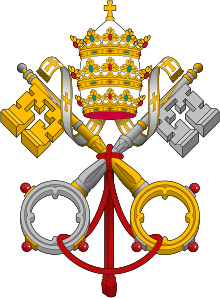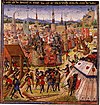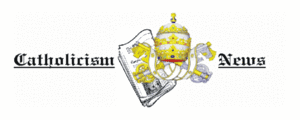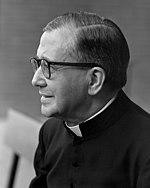
Back بوابة:الكنيسة الرومانية الكاثوليكية Arabic Уикипедия:Светци Bulgarian Portalo:Katolika Eklezio Esperanto Portal:Iglesia católica Spanish Portail:Catholicisme French Portál:Katolicizmus Hungarian Portale:Cattolicesimo Italian Portal:Katolik Malay Portal:Den katolske kirke NB Portal:Katolicyzm Polish
Introduction The Catholic Church, also known as the Roman Catholic Church, is the largest Christian church, with 1.28 to 1.39 billion baptized Catholics worldwide as of 2024. It is among the world's oldest and largest international institutions, and has played a prominent role in the history and development of Western civilization. The church consists of 24 sui iuris churches, including the Latin Church and 23 Eastern Catholic Churches, which comprise almost 3,500 dioceses and eparchies located around the world. The pope, who is the bishop of Rome, is the chief pastor of the church. The Diocese of Rome, known as the Holy See, is the central governing authority of the church. The administrative body of the Holy See, the Roman Curia, has its principal offices in Vatican City, a small independent city-state and enclave within the Italian capital city of Rome, of which the pope is head of state. The core beliefs of Catholicism are found in the Nicene Creed. The Catholic Church teaches that it is the one, holy, catholic and apostolic church founded by Jesus Christ in his Great Commission, that its bishops are the successors of Christ's apostles, and that the pope is the successor to Saint Peter, upon whom primacy was conferred by Jesus Christ. It maintains that it practises the original Christian faith taught by the apostles, preserving the faith infallibly through scripture and sacred tradition as authentically interpreted through the magisterium of the church. The Roman Rite and others of the Latin Church, the Eastern Catholic liturgies, and institutes such as mendicant orders, enclosed monastic orders and third orders reflect a variety of theological and spiritual emphases in the church. Of its seven sacraments, the Eucharist is the principal one, celebrated liturgically in the Mass. The church teaches that through consecration by a priest, the sacrificial bread and wine become the body and blood of Christ. The Virgin Mary is venerated as the Perpetual Virgin, Mother of God, and Queen of Heaven; she is honoured in dogmas and devotions. Catholic social teaching emphasizes voluntary support for the sick, the poor, and the afflicted through the corporal and spiritual works of mercy. The Catholic Church operates tens of thousands of Catholic schools, universities and colleges, hospitals, and orphanages around the world, and is the largest non-government provider of education and health care in the world. Among its other social services are numerous charitable and humanitarian organizations. (Full article...) Selected article
 The First Crusade was launched in 1095 by Pope Urban II with the dual goals of liberating the sacred city of Jerusalem and the Holy Land from Muslims and freeing the Eastern Christians from Muslim rule. What started as an appeal by Byzantine Emperor Alexios I Komnenos for western mercenaries to fight the Seljuk Turks in Anatolia quickly turned into a wholesale Western migration and conquest of territory outside of Europe.Both knights and peasants from many nations of Western Europe travelled over land and by sea towards Jerusalem and captured the city in July 1099, establishing the Kingdom of Jerusalem and other Crusader states. Although these gains lasted for less than two hundred years, the First Crusade was a major turning point in the expansion of Western power, as well as the first major step towards reopening international trade in the West since the fall of the Western Roman Empire.
Selected image
 Credit: Stevenj Joan of Arc, or Jeanne d'Arc in French ,(c. 1412 – May 30, 1431) was a 15th century national heroine of France. She was tried and executed for heresy when she was only 19 years old. The judgment was broken by the Pope and she was declared innocent and a martyr 24 years later. She was beatified in 1909 and canonized as a saint in 1920. Selected biography
 Pope John Paul II (Latin: Ioannes Paulus PP. II, Italian: Giovanni Paolo II, Polish: Jan Paweł II) born [ˈkaɾɔl ˈjuzεf vɔi̯ˈtɨwa]; 18 May 1920 – 2 April 2005) reigned as the 264th Pope of the Roman Catholic Church and Sovereign of the State of the Vatican City from 16 October 1978, until his death, almost 27 years later, making his the second-longest pontificate in modern times after Pius IX's 31-year reign. He is the only Polish pope, and was the first non-Italian pope since the Dutch Adrian VI in the 1520s. He is one of only four people to have been named to the Time 100 for both the 20th century and for a year in the 21st. Canonized in 2014, he was made the patron of World Youth Day even before canonization, for 2008 in Sydney, Australia. He started those days for youth in 1986.
Did you know...

Related portalsFeast Day of June 26
Selected quote

News
SubcategoriesTopics
The Holy Bible:
Particular Churches (grouped by liturgical rite):
Things you can do
External resourcesWikiProjectsAssociated WikimediaThe following Wikimedia Foundation sister projects provide more on this subject:
Discover Wikipedia using portals |
© MMXXIII Rich X Search. We shall prevail. All rights reserved. Rich X Search
































